
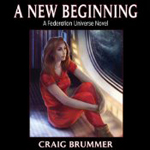 A New Beginning
A New Beginning
By Craig Brummer; Narrated by Jack Nolan
Publisher: C&S Press
Publication Date: August 2013
[UNABRIDGED] – 7 hours, 32 minutes
Themes: / slavery / space / bureaucracy / mega-corporations / politics /
Publisher summary:
A New Beginning is the story of a young woman who is ordered by the courts of Earth to serve as an indentured slave to the corporation that held her college debt. Life as a slave brings her to the brink of suicide and an attempt to kill her tormentor. She is sold to Spacers, who are themselves rebelling against the corrupt control of Earth’s mega-corporations. In space she finds a chance at a new life, a chance to maybe help her sister avoid the same fate, but only if Spacers succeed in gaining their freedom. The course of her life will be determined by the outcome of politics far outside of her control… but she has a chance, however slim, to save her sister and start a new life herself.
In some way, this was a really odd book for me to read. The main character is named Kristin. She works on a space ship as a systems engineer. I work on satellites as a systems engineer. And, honestly, her description is really similar to mine when I was in my early 20’s. So it was seriously trippy to read this at times.
A New Beginning is set in the near future, a future where space travel is common place, as is living in space aboard ships or other space stations. On Earth, it’s a rather bleaker picture of the world today. Corporations have taken over the world, bought out most of the politicians. It’s a society, world-wide, where the class gap is as wide is it can be and only those born into or who marry into privilege have assurance of a “normal” life. The rest are sold into indentured service to pay of their debts, whatever they are; for main character Kristin, this is the price of her college education. It’s also a future where faster-than-light travel has been made possible, but communication–visual and audio (in the form of communiques between spacecraft)–is limited to light speed. I’m not quite sure how that is possible, to be honest, but it sets up some interesting potential so I decided not to worry about it.
As the story starts, a newly formed “Federation,” comprised of those living and working on the ships and stations, those without ties to Earth, decide to break ties with Earth and form their own…well, federation. Think of it like Star Trek. Where once they were tied to Earth, they now consider themselves independent entities, willing and happy to trade with Earth, but not bound by any of their laws–or taxes. This has important ramifications for Kristin Hayes, whose indentured service was just sold from an Earth corporation to a ship in the Federation. She left behind a life of debt and slavery (including sexual slavery) on Earth and, upon joining the ship, was freed. The Federation, her ship The Valiant Lad, bought her indenture contract (along with that of others) and gave her the option to return to Earth as a free woman or to join the Federation, join the ship’s crew. Kristin decided to join the ship’s crew and for the first time in her life, have a real job, earn real wages, and be allowed to be a “normal” person.
Kristin’s story comprises most of the book. There are two story lines (that are sort of broken into 3 in places), one of the Federation officers who are actually coordinating the secession from Earth, and Kristin’s story line, telling of her life, both on and off the ship. Kristin’s story is about 2/3 of this book, though I suspect that this is the first in a series and provides decent setup for the rest of the series. Kristin acclimates to life on the ship slowly, but without much adversity. If anything, it seems that everything is just too easy. She finds friends, support, a job she can do…which is interesting, given the description of how the space-ers grow up and are educated compared with how Earth-ers are raised. Growing up in space seems a lot more intense, it seems that anybody from Earth would be at a significant disadvantage. When the Federation makes new laws, allowing families to be on ships and for crew to “fraternize,” she enters into a relationship with a crew mate fairly easily, despite her emotional scars. Kristin decides that she should use this opportunity to earn money (and save it) so that she can get her sister and her father off Earth, to help them avoid the troubles she had. One way she earns money is by selling her journal as a book; the journal she wrote of what her life was like on Earth as a child and then as an indentured servant for one of the corporations. It became an overnight success (almost literally) and made her into a celebrity. As I said, the only “trouble” I really had with this part of the book is how easy everything was. Kristin had a few small stumbling blocks to overcome, but the narrative made it sound like they were easily triumphed over, so overall she didn’t face much adversity.
Similarly, the second story line–comprising a third or less of the book–seemed….easy. The main thrust is told from two viewpoints, one of the ship captain (Marshall?) who announced the secession, and one of another ship captain (Matthews? A woman, in either event, which was nice) who oversaw some of the battles between the Earth ships and the Federation ships. This is where I think the book truly had a miss. It was odd enough that it was all too easy–the battles were short, sweet, and rarely with any Federation losses–but there was an opportunity for Brummer to capitalize on some interesting tactics, an opportunity lost in this book. As I mentioned earlier in the review, technology has evolved to a point where faster-than-light travel is possible (and used) but faster-than-light communication is not. This means that when battling on a large scale, your information is only as good as your distance (in light years/hours) from the source. This was touched on briefly in Kristin’s narrative. One of her co-workers mentioned that for spare money, he makes games to teach kids about battle tactics and the math used in FTL travel and war. He mentioned that all kids who grow up in space have to learn this, and have to use it…but then, nobody did. In all of the battles, it seemed like the information at hand was “good enough” and that the Federation mostly won without issue. While the battle scenes were mercifully short (nothing drives me up a wall than too much detail on weaponry or super-detailed tactics), they were almost too dry. It seemed, once again, too easy.
Some of the issues with the battle scenes might have been owed to the narration. The narration, while mostly fine, was just that, fine. Nolan didn’t add much excitement or change in tone for any of the scenes. He didn’t use different voices for the characters (except maybe some of the characters on the primary Federation ship–the Freedom?–they sounded like they were lifted from the scenes in Star Trek). The recording itself occasionally echoed or sounded like it was recorded with an unfiltered microphone. It often sounded like there was a low-level hiss in the background, or air flowing. This was noticeable when I used earphones and in my car audio and was occasionally distracting.
All in all, the book wasn’t a bad entry novel for a first-time author, though the science fiction elements were more window dressing than actual story components. I suspect some of the audio issues were due to it not being one of the larger publication houses, and that’s okay. I would recommend this book to someone looking for some light science fiction that frankly isn’t much of a downer (because let’s be honest, a lot of it can be extremely depressing). It will be interesting to see where Brummer goes with this universe. If all the novels end up having this same tone/lack of adversity, it could get boring, but for a first-in-a-series by a new author, it was pretty alright.
Posted by terpkristin.

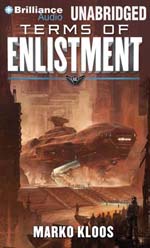 Terms of Enlistment
Terms of Enlistment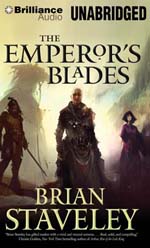 The Emperor’s Blades (Chronicle of the Unhewn Throne #1)
The Emperor’s Blades (Chronicle of the Unhewn Throne #1)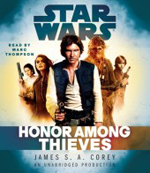 Honor Among Thieves: Star Wars (Empire and Rebellion)
Honor Among Thieves: Star Wars (Empire and Rebellion)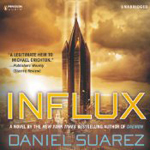 Influx
Influx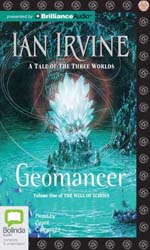 Geomancer (Well of Echoes #1)
Geomancer (Well of Echoes #1) A New Beginning
A New Beginning